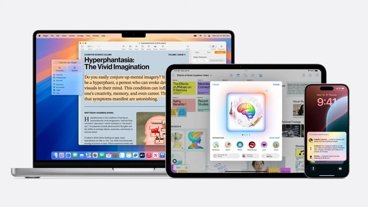Apple on Monday pushed out yet another new build of its iOS 9.3 mobile operating system, attempting to fix issues related to an Activation Lock bug that presented itself on older iPhones and iPads.
Still identified as iOS 9.3, the new update is distinguished with a new build number, 13E237. Users who have been stuck on the Activation Lock screen since last week may need to restore their device via iTunes to upgrade to the new version and address the issue.
Apple stopped signing the previous, broken version of iOS 9.3 for older devices last week. The problem occurred in the password authorization phase of the iOS 9.3 setup process.
Apple confirmed that the problem affected iPhone 5s and earlier and iPad Air and earlier. AppleInsider was first to report on the issue, noting that certain device owners were unable to proceed past the password authentication stage after updating to iOS 9.3.
Some users found success in downloading iOS 9.3 through iTunes on a Mac and installing the firmware via a hardwired connection, suggesting there is an underlying issue on Apple's end. Others have found a full system restore also works, though the method is hit-or-miss.
A different iOS 9.3 build, 13E236, was released specifically for the iPad 2 last week to address the authentication issue as well.
Apple has also published a support document offering workaround suggestions. The company urges affected users to reset their password through iCloud, perform an iTunes-based installation and activation, or remove Activation Lock through iCloud.com. As reported on Tuesday, those who tried these methods have found limited success.
iOS 9.3 still has another significant, unrelated bug that causes apps to crash and freeze when attempting to open hyperlinks in Safari, Mail, and Messages, as well as third-party Web browsers like Google Chrome. The issue is apparently unpatched in the new iOS 9.3 update, and affects all devices, not just older ones.
 AppleInsider Staff
AppleInsider Staff


 Wesley Hilliard
Wesley Hilliard
 Andrew O'Hara
Andrew O'Hara
 Malcolm Owen
Malcolm Owen
 Marko Zivkovic
Marko Zivkovic

 Chip Loder
Chip Loder
 Christine McKee
Christine McKee
 William Gallagher
William Gallagher



-m.jpg)





21 Comments
With all the betas 9.3 had how are there so many bugs right out of the gate?
This shows just how hard it is to do updates. With all of the time Apple spent on this one, and with all the developer betas that went out, including the many thousands of people on the beta program, apparently not one had this problem, which appeared instantly after the update went out to everyone.
Of course there's a new problem (affecting my wife's plain vanilla iPad Air) with Safari locking up if a link is clicked in any search engine results page. See https://discussions.apple.com/thread/7505840?start=0&tstart=0 It doesn't affect Chrome.
As someone else noted above , what is the public beta program for if not to catch stuff like this? I have been an Apple advocate for years, and I own their stock, but I'm afraid someone is letting the ball drop with these updates. This problem is not one of a near obsolete iPad 2 with activation problems. This is an issue affecting their browser on their current (or near current) hardware.
Seems to me you're good updating devices until they're about 1 1/2 or maybe 2 years old. You keep updating them beyond that and the problems start creeping in. If you want the newest capabilities of the OS then after a certain point you just have to upgrade the DEVICE, not the software. Or be happy with what you have and leave it alone.